According to the report , the number of internet users in China reached 1.079 billion by June 2023, marking an increase of 11.09 million since December 202.. This is equivalent to the total population of the USA, Europe Union, Japan, and Mexico combined. Without a doubt, this means that China’s online market is showing consistent growth in internet applications and has plenty of opportunities to explore.
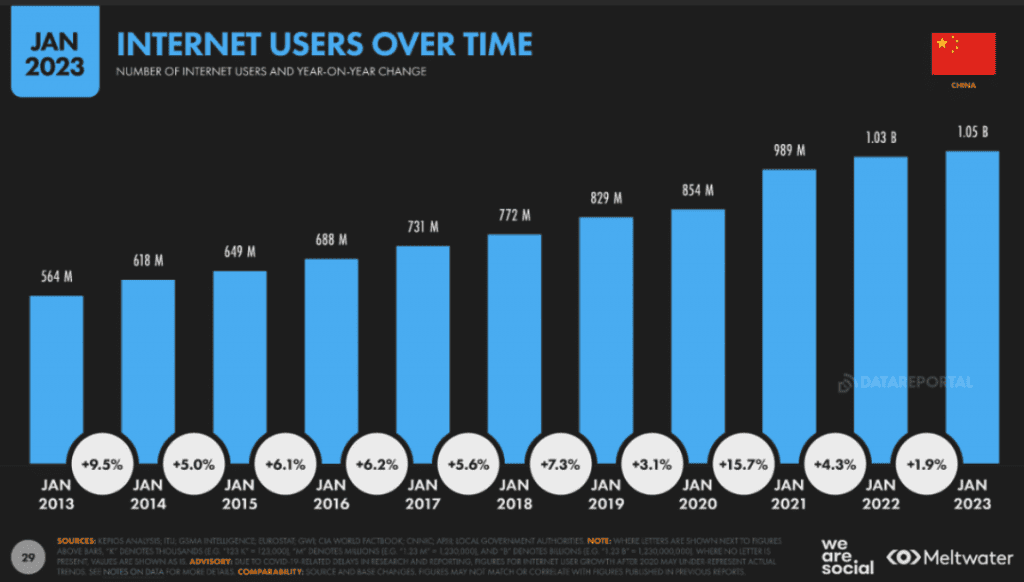
However, entering this vast market doesn’t come without challenges. In the vast digital world of China, website speed is the name of the game. No matter where users are, they want websites to load fast for a smooth experience.
But here’s the catch – if your website is slow in China, it’s more than just frustrating for users. It can seriously hurt your chances of success. Slow sites mean unhappy users, more people leaving your site, and even lower rankings on search engines like Baidu.
A recent study tells us a whopping 90% of websites take too long to load in China – more than five seconds! Users, though, expect it in just two seconds. That’s a big gap we need to bridge.
Let’s dive into why fast websites matter in China and how tackling something called ‘network latency’ can make all the difference. Stick with us as we simplify the complexities of China’s internet speed and help you navigate this digital world for success. In this article we’ll uncover the main reasons behind this issue and share some actionable advice to make your website load faster for Chinese visitors.
Test your website speed in China
Why your website is slow in China
The Chinese internet ecosystem works very differently from other countries. Therefore, there are numerous possible reasons for slow upload speed foreign websites in China.
Reason 1: Poor connection between ISP’s
Despite the vastness of the country, there are only 4 main ISP’s (internet service providers) in China: China Telecom, China Unicom, China Mobile, and China Education & Research Network (CERNET). Between the 4 of them, they cover about 95% of the total internet traffic in China and participate in minimal peering, the practice of connecting networks.
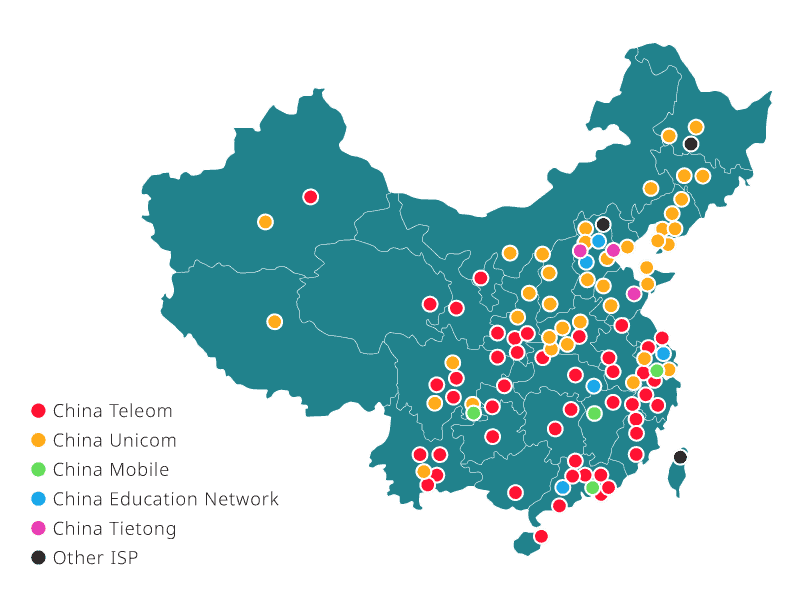
Connections that need to pass from one ISP to another are required to go through an Internet Exchange Point or IXP. But in China, the amount of IXP’s is limited, because these 4 providers are somewhat reluctant to open up the market to other providers.
Due to its limited amounts and large number of internet users, these IXP’s often get heavily congested. This causes a poor interconnection between local ISP’s, and data traveling across the country may never reach the targeted users.
There are various types of ISPs that offer different internet connections like broadband, fiber-optics, cable, dial-up, satellite, DSL, copper-based, and wireless. you must choose an ISP mindfully.
Additionally, peering with China Telecom, China Unicom, and China Mobile from outside of China is very expensive, especially in the APAC region. Direct peering with these providers often means paying premium pricing.
Combining these factors, we get: limited connectivity, lower internet coverage, and less peering points to support the demand of China’s 900 million internet users.
There are various types of ISPs that offer different internet connections like broadband, fiber-optics, cable, dial-up, satellite, DSL, copper-based, and wireless. you must choose an ISP mindfully.
Reason 2: The Great Firewall of China
The Great Firewall of China – or GFW is a combination of legislative actions and technologies to regulate the internet censorship within China’s borders. What it mainly boils down to is blocked access to selected foreign websites and applications, and slowed-down cross-border internet traffic. Examples of famous websites and applications blocked by the GFW include Facebook, Google, Instagram, and more.
The main reasons why the GFW is causing slow loading times include:
- Traffic entering and leaving the country must go through a limited number of international gateways, adding layers of latency to user requests.
- It uses Deep Packet Inspection to monitor the internet, which may cause packet loss, meaning that the requested data couldn’t make it to a user’s computer because data is lost.
This is then magnified by the poor ISP connection issue. Now, the lost packet has to be retransmitted via the congested line, which results in slow load times and a bad user experience. Many countries route international data traffic through a few internet gateways to improve efficiency.
What are other Reasons For Slow Websites In China
In addition to government censorship and firewalls that limit access to foreign websites and applications that are deemed inappropriate or sensitive, there are other factors presenting distinct challenges for companies aiming to establish a digital presence in China’s market.
Reason 3. Network latency
Ever wondered why your website takes its sweet time loading in China? Well, let’s talk about two troublemakers in the mix: network latency and distance. Network latency is the waiting time for data packets to do their little travel dance between your user’s device and your website server.
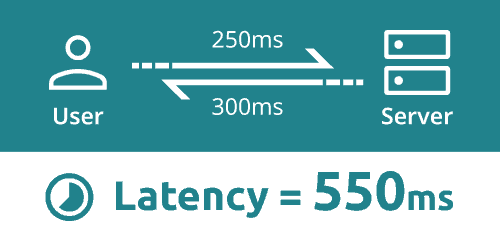
Considering the importance of network performance, network latency is a crucial aspect to explore.
Now, let’s chat about the distance-related drama. You see, when your website server is far, far away from the eager user in China, we’ve got a classic case of distance-related latency. The more miles those data packets have to cover, the longer the wait time for them to reach their destination, and the same story goes the other way around.
So, what’s the magic fix for this latency trouble? Picture this: Hosting your website on a server that practically neighbors your target audience. How? Enter the answer of web speed – by leveraging a Content Delivery Network (CDN) with strategically positioned Points of Presence (PoPs) in the Asia-Pacific region, such as Hong Kong or Singapore, can significantly improve speed for users compared to accessing websites hosted on servers located in the US or Europe.
Reason 4. Heavier Website, Slower Speed
In the digital landscape, the weight of your website matters. If your site is loaded with data, especially high-resolution images or videos, get ready for the slowdown. Users, being the impatient bunch they are, might ditch your site for faster alternatives, frustrated by the lag.
Take e-commerce sites in China, for instance. Big, beautiful product images are a must, right? But here’s the catch – if those images aren’t compressed or optimized, they’re going to take ages to load. And in the world of online shopping, time is of the essence.
To enhance website performance for Chinese users without compromising brand integrity and visual appeal, employing optimization strategies is crucial. Optimizing your website involves compressing files, shedding unnecessary plugins/scripts/assets, and downsizing those image files. It’s not just about speed; it’s about keeping that visual appeal intact. Caching techniques add another layer of wizardry, reducing content turnaround time. Browsers then only need a part of the site, not the entire buffet of assets, every time someone browses. It’s like magic for your website, keeping things swift and stylish for our Chinese users.
How does slow loading page speed affect your business in China?
Statistics show that 53% of mobile site visitors will leave a page that takes longer than 3 seconds to load times; a 100-millisecond delay in website load speed affects conversion rates by 7%.
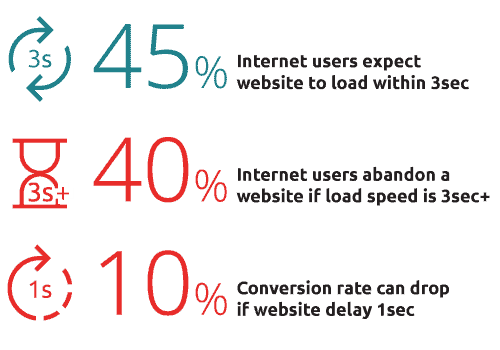
This is why it’s so important to optimize your website for the Chinese market. By making sure your website loads quickly and performs well, you can improve the user experience and increase your chances of converting visitors into customers.
Consider how you view a website that doesn’t perform well. If it’s slow to load times, you’ll likely close the page. If it lags even after loading while you’re trying to navigate, you feel frustrated and don’t want to be there.
How to increase website loading speed in China?
No matter where your customers are located, Your brand reputation depends heavily on website performance and speed, regardless of your customers’ location. We will provide general and China-specific tactics to improve your website loading speed in China.
Here are 5 simple ways to improve the speed of your website.

1. Monitor website performance
What gets measured, gets managed! So let’s start with first things first, monitoring your website’s performance. It’s important to get a clear picture of your site’s speed by regularly testing your load speed locally during peak usage periods in China. This will go a long way in figuring out which elements are negatively affecting your website performance, or on the contrary, finding which things are working well. Test your website speed performance in China for free with Mlytics.
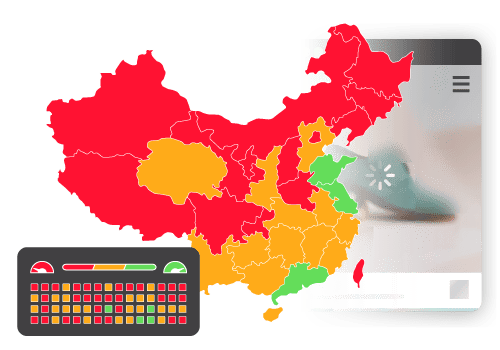
2. Reduce web page size
In simple terms, the speed of your website decreases as its size increases. In recent years, the average page size has grown significantly due to the inclusion of heavy content such as videos, images, Javascript, and fonts. Although these elements enhance the user experience, they also contribute to the page’s overall size.
There are two simple tactics to successfully reduce your page size:
- Reducing your page size can be achieved through two simple tactics. The first is to minify your resources, which includes HTML, CSS, JavaScript, and other related media. This can be done by removing unnecessary characters like spaces, code comments, and unused code. By doing so, the browser can process the resources faster, resulting in faster loading times for users. Additionally, businesses can transmit and use less data.
Optimize images and video by reducing the file size as much as possible without sacrificing the quality of the content. China’s netizens love content-rich websites, and at the same time it is crucial to not compromise aesthetics with performance. Hence, optimizing your visuals is one of the most important tactics to consider when reducing your page size. Choosing the proper file format and compressing the files will prove helpful throughout this process.
3. Embrace browser caching
When a browser loads a web page, files such as HTML, Javascript, CSS and images are downloaded and displayed to the site visitor. If the page contains plenty of files, this may slow down the overall speed of your website, and negatively impact the user experience. This issue can be addressed with browser caching.

Browser caching downloads and stores some of the files locally in the visitor’s browser at the time of their first visit. Next time when the user comes back or refreshes the page, these files are stored and the browser doesn’t need to download them again. As there is less data to download, less requests need to be made to the server, and page speed will be increased.
4. Reduce DNS Lookups
China’s system must look for your DNS record on the international internet which slows processing time, and it might not resolve on the first click.
One way to reduce DNS lookups is to host the resources that require DNS lookups, reducing the time and allowing for flexibility from a resource allocation perspective (caching, using CDN).
If you find it necessary to use DNS lookups from third-party sources, consider adjusting the cache times (TTL) based on the type of record. This can help minimize the need for DNS lookups. Additionally, you can preload DNS lookups into your cache beforehand to reduce waiting times. Finally, it may be beneficial to switch to a different DNS provider if you experience issues with your current one.
5. Eliminate blocked content
The Great Firewall of China blocks access to numerous foreign websites and applications. This is the case for social networking sites and social media like Facebook, Twitter and Instagram, as well as websites that contain sensitive information including gambling, pornography or political matters.

Those types of content may be blocked and cause your website to lag in loading speed or only load partially. Hence, to accelerate your web page speed for users in China, bringing this type of content to a bare minimum is definitely worth considering.
China-specific tactics to boost performance
1. Host your website in China
Why hosting your website in China will boost site speed
The infamous Great Firewall of China makes it challenging for foreign websites to penetrate the Chinese internet. This results in low loading speeds and even failure to be reachable from within China.
An efficient way to tackle this challenge and boost your site performance is to host your website within the Chinese borders. By hosting your site locally, time spent on domain name lookups is automatically reduced as the server is based in China. In addition, if you comply with local regulations, your site won’t be screened or blocked by the GFW since your server resides within China’s Internet firewall.
Quicker speed time and decreased risk of being blocked are two of the main reasons why hosting your website within Mainland China will be beneficial to your page load speed.
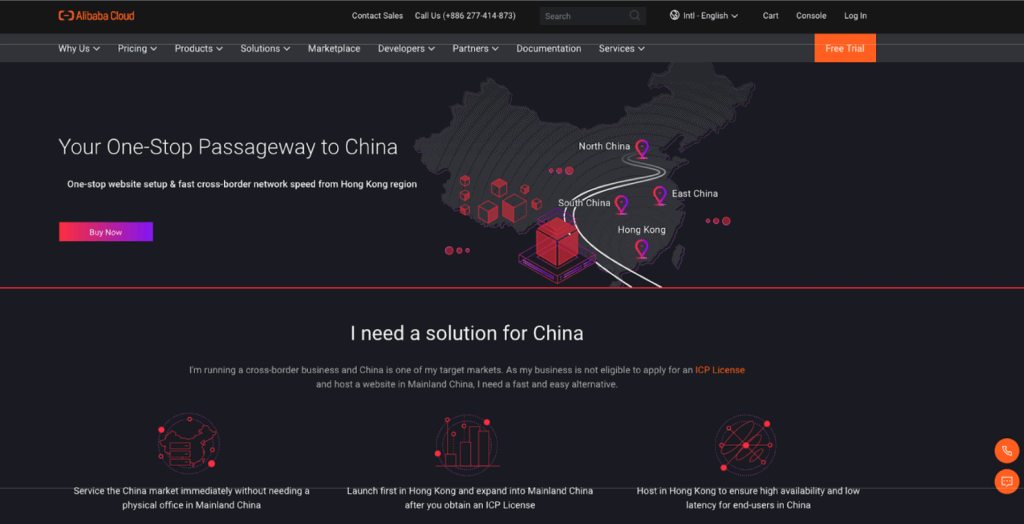
How to host your website in China?
You can choose for dedicated or shared hosting. While both have pros and cons, dedicated hosting will have favorable results in the long run as it will help with SEO ranking on Baidu, Tencent Cloud, and AWS China.
If you want to host your website in China, the first thing you need to do is get a Chinese Internet Content Provider (ICP) License. This is a registration number that the Chinese government issues, which allows you to host your website from a server in China. Hosting providers are required to comply with this law, so without the license, you may be able to purchase hosting and a domain name, but your website will not be able to go live. You can learn more about ICP and decide whether or not to apply for one by visiting this website.
Getting an ICP license is not directly related to website performance. However, it is a requirement to host website content locally, improving load time and performance.
2. Implement a China CDN solution
Why implementing a China CDN solution will boost site speed
While local hosting will help boost website performance, it can never guarantee extraordinary speed. To fully optimize website speed in China, you should consider implementing a China CDN solution.
With a China CDN solution in place, the CDN caches your website content and loads your site faster based on the viewer’s geographical location. Working with a China CDN can also help overcome some of the barriers to entry into the market while ensuring top-tier performance.China CDNs utilize local edge servers or Points of Presence (PoP) to deliver your website to the local audience at a much faster speed than coming from outside the country. Points of Presence are the intersections of critical networks.
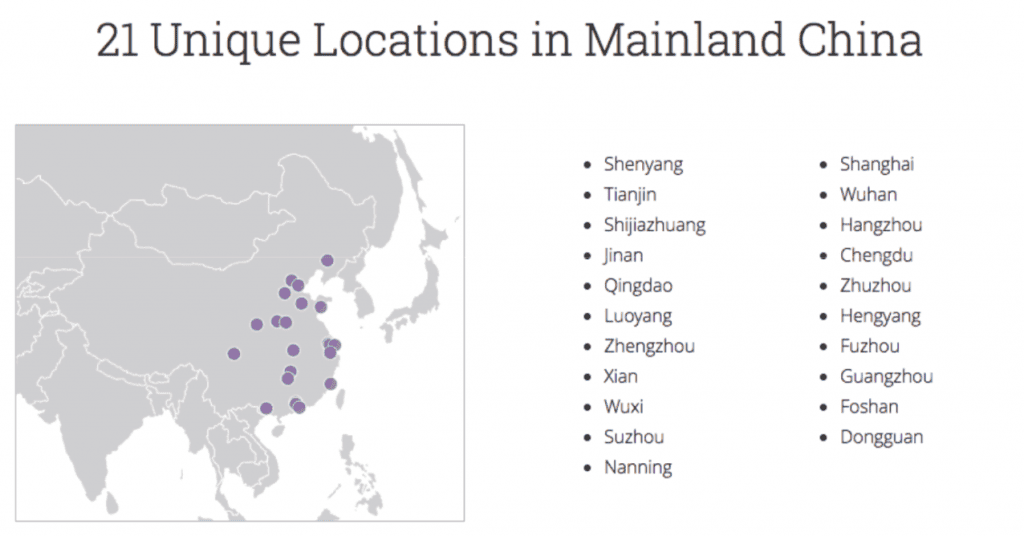
About China CDN solutions
While evaluating suitable CDN solution providers to partner with, be mindful of the following factors :
- The number and locations of PoPs
- Relationships with ISP’s
- Pricing
We shared an in-depth overview of trusted China CDN solution providers with their pros and cons here.
About ICP licenses
Also, in order to use a China CDN, your website needs to be locally hosted, and therefore you also must obtain an ICP License. Here is a brief overview of what to expect when applying for your ICP license. You are eligible to submit an application if:
- You have a Chinese business license.
- You are on behalf of a business if you physically come to China and use your passport as an ID and remain in the country long enough to fulfill the registration requirements.
- You run a joint-venture with a Chinese partner.
But you may not qualify if:
- Your foreign business does not have a legal business presence in China.
- You are a foreign individual without a passport (and presumably not residing in China). If you want to use a China CDN, your website needs to be hosted locally, and you need to obtain an ICP License. To apply for the license, you must have a Chinese business license or be physically present in China and use your passport as an ID. You can also apply if you have a joint-venture with a Chinese partner. However, you may not qualify if your foreign business doesn’t have a legal presence in China or if you’re a foreign individual without a passport and not residing in China.
To apply for ICP, you need to follow these steps:
- Buy hosting.
- Submit your ICP application and supporting documents to the hosting company.
- The hosting company will review your application and documents for accuracy and completeness.
- Once verified, the hosting company will send your ICP application to the Ministry of Industry and Information Technology (MIIT).
- If approved, the MIIT will notify the hosting company to unlock your account.
You, as a foreign website owner, will not have any direct interaction with the MIIT during the process. Additionally, there is no option to appeal if your application is rejected.
In essence, securing an ICP license can be a time consuming and costly process, sometimes without a successful outcome. So, what are the other options?
3. Content delivery solution without ICP license: China rim CDN
Ever wondered how to navigate the intricate web of China’s digital landscape without the hassle of ICP licenses? Enter China Rim CDN solutions, a game-changer for foreign website owners seeking optimal performance in the Chinese market, to boost website performance in China without having to host locally and go through the ICP application process.
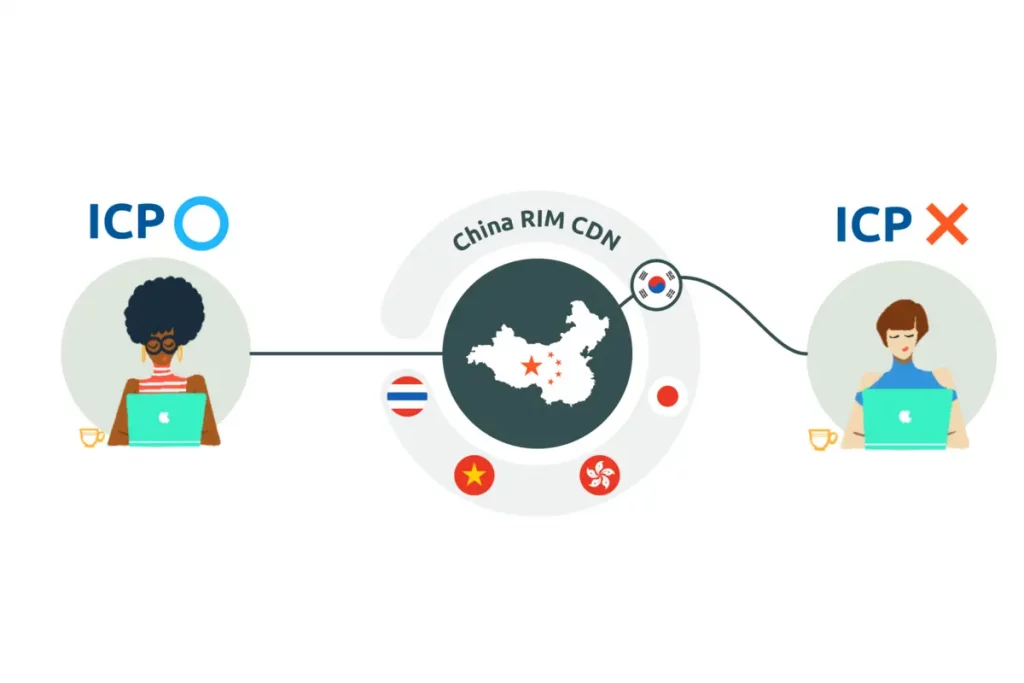
These solutions strategically leverage CDNs with nodes situated in Korea, Thailand, Vietnam, and nearby destinations – just outside the Chinese borders. The result? Exceptional performance that outshines many global CDNs in the market. And here’s the kicker: Applying for an ICP license can be a daunting task, both challenging and cost-inefficient for many foreign website owners.
Now, let’s be real – China Rim solutions may not outshine their China CDN counterparts, but here’s the catch: If your main goal is to boost visibility for your site in China without diving into the complexities of an ICP license, this solution is well worth your consideration.
But that’s not all. Elevate your game by expanding video streaming coverage in China and ensuring an unmatched viewer experience with Mlytics Video Stream edge cloud services.
It’s not just about minimizing latency; it’s about gaining real-time actionable data analytics. Dive into the future of website performance in China with China Rim CDN solutions – your shortcut to visibility, speed, and success in the vast Chinese digital landscape.
Last Words
In the ever-evolving landscape of China’s internet infrastructure, foreign websites often face hurdles in delivering a smooth user experience to their Chinese audience. As we step into 2024, optimizing website performance in China remains a priority, especially when it comes to speeding up those page loads. Fortunately, there’s a playbook of tactics at your disposal, encompassing both general strategies and China-specific approaches. But here’s the thing – finding the right solution requires careful consideration of your goals, expectations, time, and budget.
Let’s dive into the world of website optimization and make 2024 the year your online presence shines in China.



